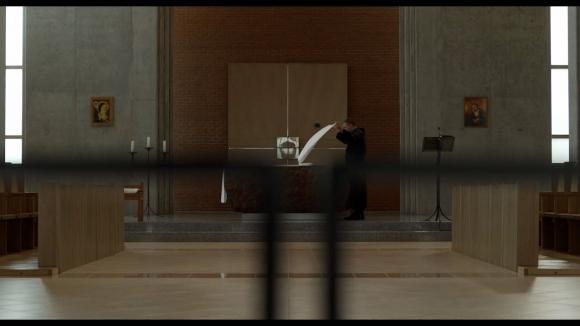A celebration of being

“Gregorian chant has no structure, music just floats,” says one of the interlocutors in Jokūbas Vilius Tūras’ latest film ‘Sacred Time’. The same cannot be said of the documentary film itself, which, like that choral, floats also, but has a very clear structure – unpretentious (which doesn’t necessarily mean bad), articulated, concrete. You could call it a documentary of “talking heads”, but with the seasoning of poetry. The structure allows the story to breathe, which, as can be easily understood from the first shots of the film, is extremely important, close and interesting to the author. A synthesis of tasteful intimacy and clear articulation.
The director has a specific goal – to present the Gregorian chant tradition in Lithuania through his lens. And who is better to present the topic, if not the interlocutors, who themselves cherish that tradition and can tell about the subject not only wholeheartedly, but also from the technical perspective? In “Sacred Time”, music professionals talk, and also those for whom music, the very moment of participation in the ritual that makes faith meaningful, seems to be a sort of salvation, getting closer not only to God, but also to the very essence of being. Such an unconditional certainty, of which the director tries to scatter at least the crumbs to the viewer: you see the choir, you hear the choir, but to understand, you obviously need a live encounter. Just such is the nature of the represented phenomenon. And no one here is trying to cheat, rather on the contrary, to lull in to having a desire to try it out. Slowly, consistently, from the origins to the very moments of singing and the accompanying experiences, they tell it – in an understandable language, without too much pathos. Just like a normal person.
In the film, which lasts a little over 30 minutes, the junction between “wholeheartedly” and calculation, measured rationality, seems to be one of the main driving forces. Of course, the topic can be unfolded in a more pragmatic, historical, specific way, but this would hardly drift the unenlightened viewer somewhere. Rather on the contrary, it would alienate and eliminate pleasant floating, which seems to elevate, carry somewhere. Beata Baublinskienė, a musicologist and a member of the Schola Gregoriana Vilnensis Choir, tells with admiration how the monks just get into chanting, for them it doesn’t matter what is the breed of that music. They just chant and the magic comes out. From that being together, which could be described as the main topic emerging from behind the delivered subject. “There were separate boys’ and women’s choirs, but we realized that we can’t do without each other and we got together,” says one of the interlocutors.
The director of this short film is in no hurry – he arranges compositions from travel shots, walks around the spaces where the community gathers, the chanters themselves. Slowly, somewhat poetically, intimately, with due respect, even with a certain tenderness and attention, conveyed by colours, compositions. The narrative assembled from the images captured by the camera, which sometimes shake, sometimes are extra static and allow you to look at the details, reveals the director’s connection with the captured environment – it is definitely not unfamiliar to him, quite the opposite – it is very close to him. Jokūbas Vilius Tūras is not just the director of the film, but also the cameraman, screenwriter and even the producer, so his hand is felt in almost every element of the film. It is clear that this is a personally important topic for the creator and he does not hide it – he clearly shows it by inserting footage how he travels by his car from point A to point B, from Vilnius to Panevėžys, maybe even trying to represent the journey of his own life. And that half-hour is such a sacred time – about the community, the celebration of being together, to which you will be accepted even if you do not have specific skills. And the director would hardly ignite such an idea if he tried to prove something artificially – such a pose would not really fit here.